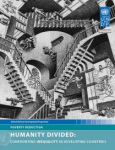Inequality can undermine development, poverty reduction and growth, and harm the quality of relations and individual self-worth, according to a report launched by the UN Development Programme (UNDP).
To reduce inequality, the report recommends more inclusive growth patterns, changes in social norms and redistributive policies.
 29 January 2014: Inequality can undermine development, poverty reduction and growth, and harm the quality of relations and individual self-worth, according to a report launched by the UN Development Programme (UNDP). To reduce inequality, the report recommends more inclusive growth patterns, changes in social norms and redistributive policies.
29 January 2014: Inequality can undermine development, poverty reduction and growth, and harm the quality of relations and individual self-worth, according to a report launched by the UN Development Programme (UNDP). To reduce inequality, the report recommends more inclusive growth patterns, changes in social norms and redistributive policies.
‘Humanity Divided: Confronting Inequality in Developing Countries:’ analyzes global trends; identifies causes and extent of inequalities; presents policymakers’ perceptions of inequalities in 15 countries; and suggests a policy framework for combating inequality. A survey included in the report finds that income inequality is a high or very high priority for 79% of policymakers from 15 developing countries.
“There is nothing inevitable about growing inequality,” UNDP Administrator Helen Clark declared, noting that “with inclusive growth, resolute leadership and citizen action” several countries have achieved strong growth while reducing or containing income inequality. The report aims to contribute to global dialogues, including on the post-2015 development agenda, about the causes and consequences of inequalities, as well as how to address them.
Income inequality increased an average of 11% between 1990 and 2010 in developing countries, and over 75% of the population lives in a society where income is more unequally distributed than in the 1990s, according to the report. Other key messages include: inequality represents a threat to long-term economic and social development; and links between inequality of outcomes and inequality of opportunities should be taken into account to address inequality.
The report also addresses inequalities beyond income, including education, health and nutrition disparities, as well as gender inequality. For instance, although women participate more in the work force today, they still earn significantly less than men, are underrepresented among political decision-makers and are disproportionately represented in vulnerable employment.
The report proposes addressing inequality through three pillars: moderating income inequality; closing gaps in education, health and nutrition; and addressing social exclusion and discrimination. Additional recommendations include: prioritizing public expenditure on universal provision of social services and protection; strengthening disadvantaged groups’ political agency; and broadening civic engagement. [UN Press Release] [UNDP Press Release] [Statement of UNDP Administrator] [Report Website] [Publication: Humanity Divided: Confronting Inequality in Developing Countries]